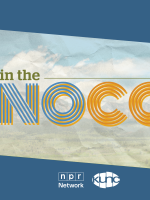Longmont author and journalist is fascinated by climate disaster stories. He says they’re often teachable moments.
“There’s so much to be learned from looking in the past — environmental histories and histories of instances of when people have tried to control nature and ultimately it's failed,” Miller said.
In his new book, “Over the Seawall,” Miller examines the deeper impacts of some of these failures. He investigates how governments and people are using infrastructure to slow or stop the effects or the symptoms of climate change – giant concrete barriers in Japan meant to stop tsunamis, for example, or dams and canals in Arizona meant to make a desert move-in ready for lots of people. Government policies created to manage the Colorado River and distribute water among its unquenchable stakeholders are another example.
In other words, Miller says people are keen to adapt and that seems great, “but it can also be tricky if it causes us to rush into rash decisions,” he said. that work with nature, not against it, are often more successful in the long run.
Miller joined In The NoCo to discuss the book, and some of humanity’s attempts to adapt to climate change that have not gone according to plan.
NOTE: This is an encore of our episode from Dec. 8, 2023.







